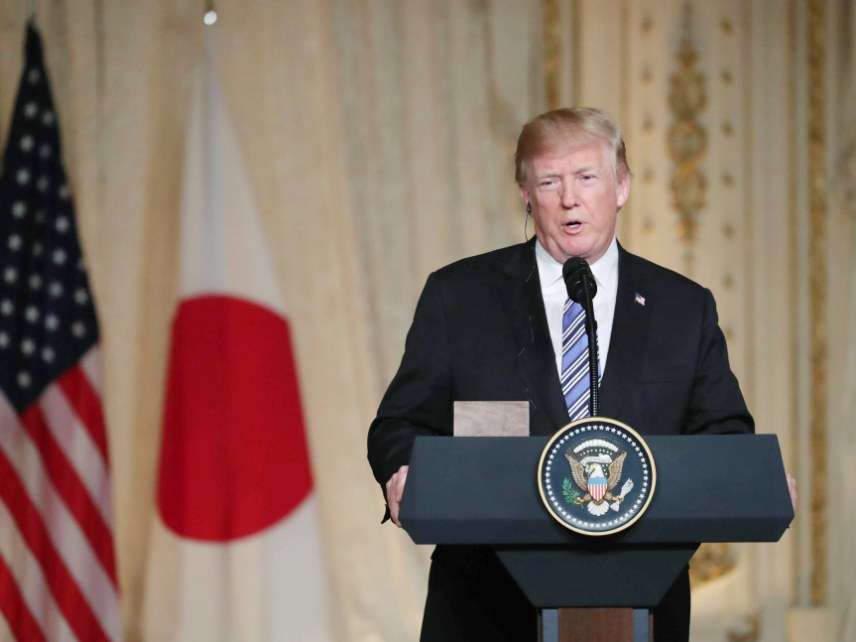Trump Wants to Have it Both Ways on Trade. He Can't.
Tariffs and import restrictions are the equivalent of putting sanctions on your own country.

No one would ever accuse Donald Trump of meticulous adherence to the rules of formal logic. But even the president ought to realize the strongest argument against Trump's tariffs on American imports has been made by Trump himself.
In early May Trump announced the U.S. was withdrawing from the Iran deal. Among other things, this means the re-imposition of sanctions—the "highest level" of sanctions, as he put it, which he said would be "crippling." Those sanctions include efforts to block Iranian oil sales, limits on Iran's ability to access international banking systems, and measures to prevent Iran from trading with other countries.
That last provision would "have a swift effect on some big companies," Fortune reported. Among them: Boeing and Airbus, which "had been planning to start selling aircraft to the Islamic Republic for the first time." General Electric also will be hit hard: "Not only is it one of the U.S. companies making parts for Airbus, but it has also received big parts orders for oil and gas facilities in Iran." Volkswagen had started selling cars in Iran, and might have to stop. Ditto for the French company that makes Peugeots.
Sanctions such as these will hurt Iran, the administration and others argue, by depriving it not just of oil revenue, but of consumer goods and opportunities for employment.
As one analysis by the Foundation for Defense of Democracies put it in 2014, when the Obama administration was easing sanctions as a carrot to entice Iran to negotiate, the easing of sanctions provided "economic relief. … The value to the Iranian economy of sanctions relief … includ[es] employment growth. … [A] sanction relief provision that allows for the resumption in imports of auto parts … promotes economic growth since auto parts are used to build cars for domestic consumption. … [T]he suspension of sector-specific sanctions also provide a boost through facilitating imports into Iran."
Easing import restrictions, the analysis said, made an "equally, if not more important" contribution to economic growth than increased oil sales.
Reimposing sanctions, as Trump wants to do—including sanctions that limit imports—therefore will hurt Iran's economy and put pressure on the company's leaders to change their ways.
But that is the precise opposite of what Trump says about the United States. When it comes to America, the president claims limiting imports will help the country.
And he has been doing that a lot. When the administration slapped tariffs on washing machines and solar panels, Robert Lighthizer, the administration's trade representative, claimed it was part of the administration's efforts to "defend American workers, farmers, ranchers and businesses."
When the administration slapped tariffs on steel and aluminum, it claimed doing so would "reduce our reliance on foreign producers" and protect "our national security" by lowering imports that have the effect of "displacing domestic production." It argued that imports "are weakening our internal economy." And it suggested the tariffs were part of the administration's efforts to "promote American prosperity."
Now the administration is considering whether to hit foreign auto imports with a 25 percent tax, on the grounds of national security. "Core industries such as automobiles and automotive parts are critical to our strength as a Nation," Trump said.
Trump's cheerleaders agree. As one of them put it recently on the pro-Trump blog American Greatness, "America needs to impose large tariffs to discourage its advanced industries from moving abroad."
Well, you can see the problem. When America limits imports to Iran, that is—by Trump's logic—very, very bad for Iran. "Crippling," in fact. It reduces economic growth, stunts employment, and makes the populace miserable.
Yet when America limits imports to America, that is—also by Trump's logic—very, very good for America. It protects the domestic economy, creates employment, and makes the public much better off.
Using Trump's reasoning about tariffs, one could just as easily argue that sanctions on Iranian imports defend Iranian workers and businesses, reduce Iran's reliance on foreign producers, and protect Iranian national security. Using Trump's reasoning about sanctions, one could just as easily argue that tariffs will cripple the American economy and punish the American people.
The truth is that trade restrictions are indeed harmful—for both sides of the exchange. Limits on sales to Iran will hurt Iran, but they also will hurt Boeing, GE, and other companies. Likewise, limits on imports to the U.S. will hurt foreign producers, but they also will hurt U.S. consumers.
Trump, typically, wants to have it both ways. There's just one thing keeping him from doing so: reality.


Show Comments (53)